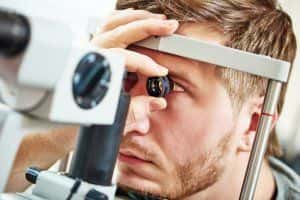Do you follow care recommendations for your contact lenses? If not, you may putting your vision at risk.
Read more
Glaucoma is an eye condition that is often characterized by an abnormally high intraocular pressure (i.e., pressure in the eye), which can ultimately damage the optic nerve. The added intraocular pressure is the result of fluid accumulation in the eye. If left untreated, it can result in complete vision loss.
Glaucoma may not produce any noticeable changes in your vision until the disease is more advanced. That’s why having regular eye exams starting at age 40 — or earlier for certain ethnic groups — is an important part of preventing loss of vision from glaucoma.
Currently, there is no cure for glaucoma. In addition, any damage to the optic nerve cannot be reversed. Once glaucoma has been diagnosed, though, several treatments including medicated eye drops and surgery are available. Treatments may slow the damage and prevent further loss of vision.
The surgical procedures performed to treat glaucoma include:
- Laser surgery (laser trabeculoplasty). This approach is performed to open drainage canals in the eye that are clogged.
- Filtering surgery (trabeculectomy). With this surgical technique, a small piece of tissue is removed to allow fluid to drain properly from the eye.
- Placement of a drainage implant, such as iStent. With this treatment option, your ophthalmologist inserts a small tube into the eye that allows excess fluid to drain.
If you notice any changes in your vision, contact us for an appointment, so we can diagnose your vision problem and provide suitable treatment options. If your vision suddenly becomes blurry and is accompanied by severe eye pain, nausea, headache, reddening of the eye or halos, contact your eye doctor or go to the emergency room immediately, as this may be a sign of vision-threatening acute angle-closer glaucoma.
-
Proper Contact Lens Care Keeps Your Lenses Comfortable and CleanCategory: Newsletters
-
What Happens When You Don't Wear Sunglasses?Category: Newsletters
Have you lost your sunglasses again? Failing to wear the glasses consistently may lead to several eye conditions.
Read more -
Curbing Macular DegenerationCategory: Newsletters, Conditions That Affect Vision
Macular degeneration represents one of the most significant causes of vision loss in older adults. According to the Centers for Disease Control and Prevention, an estimated 1.8 million people currently suffer from macular degeneration, with an additional 7.3 million people at risk of developing this
Read more -
Premature Babies and Vision ProblemsCategory: Newsletters
Prematurity can cause a range of vision problems. Fortunately, optometrists offer a range of treatments and devices that can improve your child's ability to see.
Read more -
All About AmblyopiaCategory: Newsletters, Conditions That Affect Vision
Amblyopia, also known as lazy eye, is a visual disorder caused by abnormal vision development, often occurring during infancy. Patients with amblyopia have reduced vision in one eye, because it is not working properly in conjunction with the brain. With early detection and proper treatment, loss of
Read more -
All About GlaucomaCategory: Newsletters, Conditions That Affect Vision
Glaucoma is a serious disorder that can damage the optic nerves of your eyes if left untreated. The optic nerve carries images from your eyes to your brain. If the nerve is damaged, full or partial vision loss can occur. In some cases, people develop glaucoma because the pressure in their eyes begins
Read more -
Diabetic Retinopathy: What Is It?Category: Newsletters, Conditions That Affect Vision
Diabetic retinopathy refers to several eye problems that are characterized by damage to the light-sensitive retina, caused by excessive blood sugar levels. Almost half of Americans with diabetes suffer from some level of diabetic retinopathy. When glucose levels in the blood are not properly controlled,
Read more -
Glaucoma Care: What You Need to KnowCategory: Newsletters, Conditions That Affect Vision
Glaucoma is the second leading cause of blindness worldwide, reports the Glaucoma Research Foundation. This common eye condition typically affects older adults, although infants and young adults are also at risk. Fortunately, however, cutting-edge research is improving diagnosis and treatment of this
Read more -
StrabismusCategory: Newsletters, Conditions That Affect Vision
Strabismus is the medical term for the misalignment of the eyes. Commonly referred to as cross-eyed or wall-eyed, strabismus may involve either one or both eyes turning inward, outward or even up or down. It is one of the most common vision conditions in young children, affecting somewhere between 2
Read more -
What Is Astigmatism?Category: Newsletters, Conditions That Affect Vision
Astigmatism is an extremely common eye condition that affects both children and adults. It occurs when there is an imperfection in some part of your cornea, the clear tissue that covers your iris. Light rays pass through the cornea as they travel to the retina, a thin layer of cells at the back of your
Read more -
What You Need to Know About Dry EyeCategory: Newsletters, Conditions That Affect Vision
If you have never suffered from dry eye, you might not appreciate how important your tears are to your eye health. Without enough moisture, your eyes can become dry, itchy, red and uncomfortable. Dry eye occurs when you do not make enough tears or the tears you produce are not high quality. The Importance
Read more -
Getting Used to ContactsCategory: Newsletters, Contacts
Contacts are a smart choice for individuals who are active and dislike the feeling of wearing glasses. However, the process of caring for contacts and getting used to them can take a week or two. Navigate the transition with ease by learning how to properly care for contacts and becoming familiar with
Read more -
Are Specialty Contacts Dangerous?Category: Newsletters, Contacts
Specialty contact lenses are a fun way to change your eyes to look like your favorite entertainer or to create a spectacular costume. Specialty contacts, sometimes called decorative, fashion or theater contact lenses, temporarily change the look of your eyes without correcting your vision. Eye care professionals
Read more -
Optometry Versus Ophthalmology: What’s the Difference?Category: Newsletters, Medical Perspectives
Ophthalmologists, optometrists and opticians all play an integral role in eye and vision care. While they often work in collaboration, they require varying levels of education and are qualified to help you and your eyes in different ways. If you aren’t sure who to talk to about your eyes, keep reading
Read more -
Why Is My Eyelid Twitching?Category: Newsletters, Tips for Healthy Eyes
Almost every person experiences some form of eyelid twitching in his or her lifetime. Known medically as blepharospasm, eyelid twitching is characterized by the involuntary movement or spasm of the eyelid muscles. Spasms typically occur every few seconds over the course of several minutes. Twitching
Read more -
Vision Therapy: Not Just For ChildrenCategory: Newsletters, Tips for Healthy Eyes
Vision therapy is a doctor-supervised program that helps people of all ages improve their visual-motor skills. Therapy helps your eyes and brain work together better, even if you have perfect vision. For years, people believed that some types of eye conditions, such as lazy eye or crossed eyes, could
Read more

